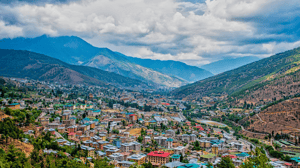In an ambitious move to enhance climate resilience in Bhutan, Geoneon, in partnership with the Department of Disaster Management (DDM), has initiated a groundbreaking project to develop an open-source tool for assessing the vulnerability of critical infrastructure to climate hazards. This initiative, funded by the World Bank and administrated by the Asian Disaster Preparedness Center (ADPC), aims to leverage cutting-edge satellite imaging and advanced algorithms to support informed decision-making in disaster risk reduction and climate change adaptation.
Building on the success of a pilot project in South Bhutan in 2022, this initiative marks a significant step towards enhancing the nation's resilience against climate-related disasters. "This project embodies our commitment to using advanced technology to safeguard our communities against climate threats," said Norbu Thinley, Chief Program Officer at the Department of Disaster Management. "Our collaboration with Geoneon and the support from the World Bank and ADPC are instrumental in achieving this goal."
Empowering Local Communities and Stakeholders
A key component of the project is to empower local entities and stakeholders through capacity building and the provision of tailored recommendations. "Our aim is not just to develop a tool but to ensure its sustainable and effective use by equipping our local partners with the necessary skills and knowledge," stated Roxane Bandini-Maeder, CEO of Geoneon.
iCARE Innovations Fund: Catalysing Climate Resilience
In alignment with this project, the iCARE Innovations Fund seeks to spark breakthroughs in climate resilience in South Asia. Focusing on innovations in data analytics, decision support systems, and standards, the fund builds on initiatives like Tech Emerge and the Climate Innovations Challenge. The fund, supported by the World Bank under the Climate Adaptation and Resilience (CARE) for South Asia project, provides US$ 2.5 million to ADPC. This funding aims to identify, scale, and pilot innovations to mitigate climate risk and enhance the climate resilience of communities vulnerable to such risks and extremes.
Strategic Implementation for Maximum Impact
The project's approach is designed to ensure maximum impact, focusing on stakeholder engagement, the development of a customised geospatial tool, and comprehensive capacity building. "Our methodology is grounded in a deep understanding of the local context, ensuring that the solutions we develop are not only effective but also resonate with the needs of the people of Bhutan," explained Hans Guttman, ADPC Executive Director.
Forward Outlook
As the project progresses, its findings and recommendations will be crucial in refining strategies for disaster risk reduction and climate change adaptation, not only in Bhutan but also in similar contexts worldwide. This collaborative effort marks a significant milestone in the journey towards a more resilient and sustainable future.

